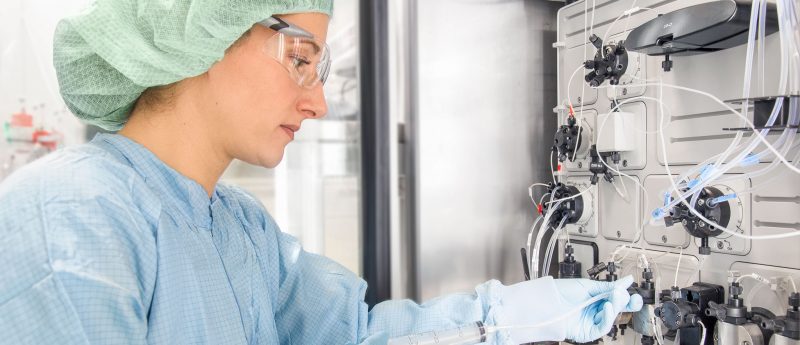Raw materials considerations for GMP manufacturing: an interview with Bernd Leistler, CellGenix GmbH

In this interview, Bernd Leistler, Vice President Development & Production, CellGenix GmbH, discusses how raw or ancillary materials can affect cell therapy development and manufacturing.
This interview is part of our focus on cell therapy development. Find more exclusive content when you visit the focus.
What is good manufacturing practice (GMP) and how can it affect the safety and quality of raw materials used in cell therapy development?
GMP is a system that ensures that medicinal products are consistently manufactured and tested according to specific quality standards. Despite arising guidance, dedicated global regulations for the manufacturing of raw materials (in the USA, raw materials are called ancillary materials) for the cell therapy space are still under development. As a result no official certification is given for the manufacturing of GMP grade raw materials. Manufacturers of raw materials can however provide GMP quality by following all applicable GMP guidelines recommended for pharmaceutical products. These GMP guidelines provide guidance for manufacturing, testing and quality assurance.
When raw materials are manufactured according to all applicable GMP guidelines, documented evidence can be provided of purity, potency, consistency and stability. GMP is therefore one of the major quality assurance systems to ensure the safety and high quality of raw materials.
When should you start to consider switching to GMP-grade raw materials?
To enable a seamless transition from preclinical development to the clinical stage we recommend identifying the appropriate GMP grade raw materials and reliable suppliers already during early stage preclinical research. Changing raw materials at a later stage in clinical development in order to meet the increased regulatory requirements often creates significant additional costs and loss of precious time. These additional costs are only to a small extend caused by higher costs of GMP grade raw materials. They are primarily driven by the need to perform time-consuming clinical comparability studies to prove the raw material changes do not alter the final cell therapy product. Switching to the required GMP grade raw materials at an early stage, i.e. directly after preclinical development, will prevent the need for such studies and thereby brings a significant economic benefit.
“It is important to find out which regulatory guidelines and local requirements apply to your process”
A study performed by the Tufts Center for the Study of Drug Development (MA, USA) estimated that the costs of an amendment for a Phase III trial costs more than three times as much as an amendment for a Phase II trial. They estimated the average direct cost to make changes to the protocols of Phase III trials tops US$1 million per study.
How could automation be beneficial for your cell therapy manufacturing process?
Automation of your cell therapy manufacturing process is needed to be able to develop commercially viable products. It increases throughput, thereby making scale-up possible. Especially for autologous therapies large-scale commercial manufacturing wouldn’t be possible without automation since the workload per dose produced is simply too high. Automating your cell therapy manufacturing process will in addition reduce costs, increase consistency (standardizing your process) and reduce safety risks by eliminating human errors.
Closed manufacturing systems, cell processing devices as well as reagents, which are standardized to a large extent, are a key requirement for automation. Since there is currently no industry standard, we are looking into ways to further optimize our raw materials to provide solutions that fit to these automated processes.
How can you secure your raw material supply chain scaling up from clinical Phase I to large-scale commercial manufacturing?
When scaling up from clinical trials in Phase I to large-scale commercial manufacturing, the number of patients and doses to be produced might go up by several magnitudes. As a consequence the supply of high-quality GMP grade raw materials is getting even more critical. Providing raw materials at a consistent high quality at highly increased amounts could form a challenge for your raw material supplier.
The safest way to eliminate possible problems with the supply of GMP grade raw materials is having a supply agreement in place well before large-scale manufacturing is planned to start. Giving your supplier a clear and reliable forecast of doses to be produced and consequently the amounts of raw material needed will allow your supplier to have enough products available on demand. As the supplier, this allows us to produce large size batches that are reserved for one customer. An additional way to further secure your supply chain is validating a second supplier for your critical raw materials.

To be able to provide our high quality GMP grade raw materials at strongly increasing quantities we have already finalized several scale-up measures and started facility expansions. We have also set up a warehouse at our USA office to further improve our overseas supply chain for our American customers.
Why is it important to ensure robust supply agreements are in place?
If high quality GMP grade raw materials are not available in time this could lead to delays in your cell therapy production. This does not only increase costs but also puts precious patient samples in jeopardy. A raw material supplier must, therefore, be able to provide materials in strongly increasing quantities in a consistent high quality. Their manufacturing processes must be appropriately designed in order to allow for a scale up as needed. The safest way to eliminate possible problems with the supply of GMP grade raw materials is therefore having a robust supply agreement in place.
How can your raw materials affect the regulatory and commercialization process?
In order to obtain a market authorization for your cell therapy it is crucial that your GMP grade raw materials are compliant with international guidelines and local requirements. When your raw materials are noncompliant or not sufficiently compliant you might have to change your process during the clinical phase. This means that you have to switch to using other raw materials or you have to perform additional safety studies. Those measures create significant additional costs and loss of precious time.
Moreover, using GMP and animal-derived component-free manufactured raw materials procured from safe and traceable sources will significantly reduce your qualification and validation efforts. By using animal-free cytokines that are produced in a dedicated animal-free facility for instance, you eliminate the need for time-consuming and expensive viral safety studies.
How can raw material suppliers support you going through the regulatory process?
Getting a clear understanding of regulatory requirements around the quality of raw materials can be challenging. There is currently no global harmonization and existing guidelines can be interpreted in different ways. It is therefore important to choose a raw material supplier that has sufficient experience and actively interacts with regulatory authorities to stay up-to-date on the international guidelines.
To help you through the regulatory process your raw material supplier should offer the following regulatory support on GMP grade raw materials:
- Auditing of their production site
- Drug Master Files for cross-reference
- Regulatory Support Files and TSE Certificates
- Change notifications prior to relevant changes
- Additional product data on request (e.g. extensive stability data)
- Customized support to meet special compliance needs
- Quality Agreements
How can you ensure you are complying with international manufacturing guidelines?
It is important to find out which regulatory guidelines and local requirements apply to your process. We recommend talking to your local authorities as early in your development process as possible so you can set up your process accordingly.
“..the average direct cost to make changes to the protocols of Phase III trials tops US$1 million per study”
You in addition have to make sure your GMP grade raw materials are compliant to USP chapter <1043>, EudraLex Part IV – GMP requirements for Advanced Therapy Medicinal Products, European Pharmacopoeia General Chapter 5.2.12. and the upcoming ISO Technical Specification 20399 on Ancillary Materials.
As a raw material supplier we are in constant interaction with major international regulatory agencies, and are actively involved in many of the regulatory initiatives and discussions. You can therefore be certain that our quality standards are in line with international regulations.
What do you think is the future of cell therapy?
With the FDA approval of the first CAR-T therapies, the cell and gene therapy space has reached another milestone in 2017. Kymriahâ„¢ and Yescartaâ„¢ are pioneers of a fast growing field in which an increasing number of cell therapy manufacturers are reaching commercial phase. The strong expansion of the cell and gene therapy space brings many challenges for cell therapy manufacturers, including the need to reduce manufacturing costs to account for the pressure on the market price.
As a result we’ve seen a lot of progress in accomplishing consistent and cost efficient large-scale manufacturing on a global scale. We think the future of cell therapy will be coming up with smart automated solutions that will enable this. We are very interested to see how this will also impact the need for customized raw materials. In certain production settings it would be advantageous to have, for example, media in a special bag or cytokines in different forms (e.g. larger fill sizes, cytokines/media mixtures or different delivery formats).
Further reading
- Getz KA, Stergiopoulos S, Short M et al. The Impact of Protocol Amendments on Clinical Trial Performance and Cost. Ther. Innov. Regul. Sci. 50 (4) 436-441 (2016)